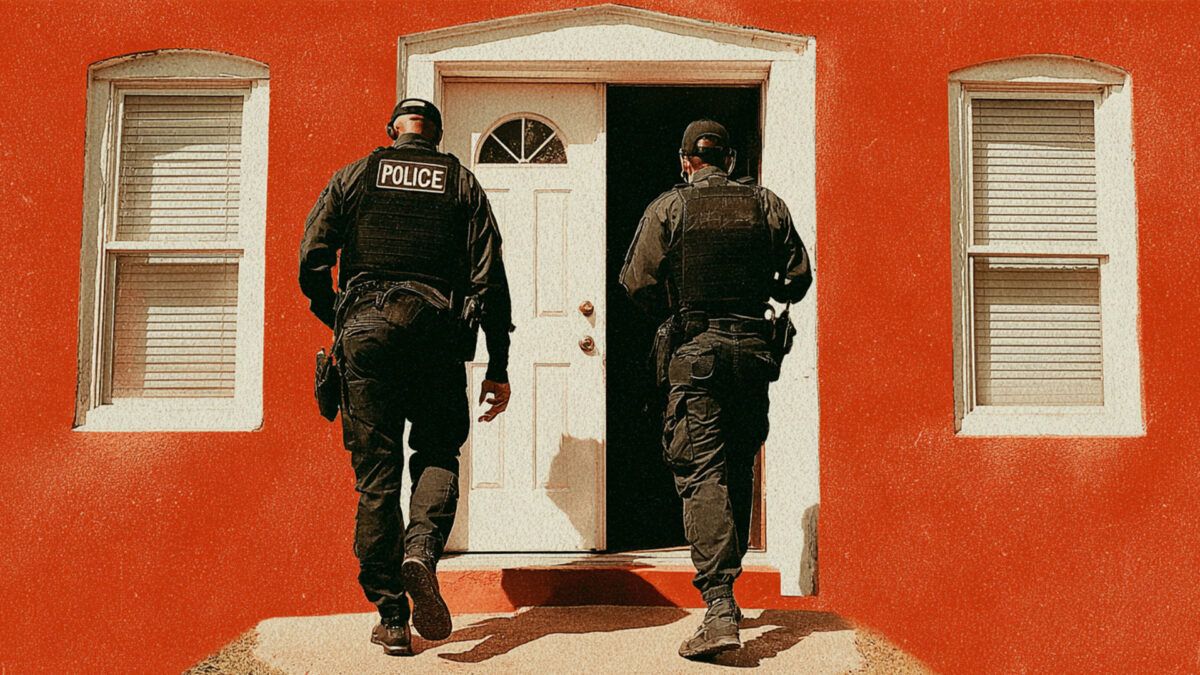Can Police Enter Your Home Without a Warrant? The Supreme Court Will Soon Decide.
Can Police Enter Your Home Without a Warrant? The Supreme Court Will Soon Decide.
Even well-intentioned “community caretaking” can’t justify ignoring the Fourth Amendment.
Amy Peikoff | 10.14.2025 10:25 AM

Illustration: Eddie Marshall | Midjourney
Swatting—a dangerous trend in which pranksters fabricate emergency reports to get SWAT teams or other law enforcement to descend on a victim's home—has had deadly consequences. In 2020, a Tennessee man swatted for refusing to sell his Twitter handle died of a heart attack when heavily armed officers arrived at his house. In 2017, a Kansas man answering police on his front porch was fatally shot after a false report of a hostage situation. Even celebrities aren't immune: twice this year, Gordon Ramsay's Los Angeles home was swatted, most recently by a caller claiming he had shot two men—fortunately, Ramsay was out of the country at the time.
Tragedies like these highlight a critical question: Should a simple call to emergency services be enough to justify sending heavily armed officers into someone's home, or should stricter safeguards be required? The U.S. Supreme Court will weigh in on that issue when it hears Case v. Montana on October 15. Case centers on a Montana Supreme Court ruling allowing police to enter a home without a warrant under a "community caretaking" exception to the Fourth Amendment.
In 2021, officers had responded to a call from William Case's ex-girlfriend, who claimed he was suicidal and ready to "shoot it out" with police. But the officers knew Case from prior interactions, and their observations at his home suggested he was unlikely to be in immediate danger. Still, about 40 minutes after arriving, they forcibly entered his home, confronted him, and shot him. Evidence gathered during that entry was later used to convict Case of felony assault on a police officer.
The Montana court considered whether evidence collected during the warrantless entry was admissible, ultimately ruling that it was. Case contends that, absent consent, government agents may enter the home—warrant or no warrant, regardless of purpose—only when they have particularized probable cause: facts known firsthand by the officer justifying the intrusion. This approach aligns with Supreme Court precedent. The Court recently rejected a "freestanding community-caretaking exception" and, in a 2006 decision, held that officers could enter a home without a warrant only "when they have an objectively reasonable basis for believing that an occupant is seriously injured or imminently threatened with such injury." Historically, the Court has consistently treated an individual's home with special protection. As it wrote in 1972, "physical entry of the home is the chief evil against which the wording of the Fourth Amendment is directed."
...
https://reason.com/2025/10/14/can-police-enter-your-home-without-a-warrant-the-supreme-court-will-soon-decide/?nab=1
 Illustration: Eddie Marshall | Midjourney
Illustration: Eddie Marshall | Midjourney